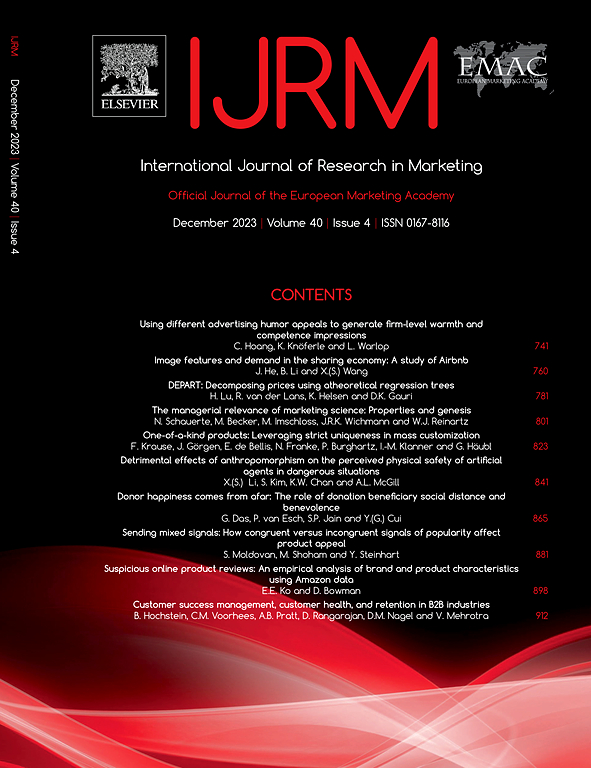理论回归怀旧:理解排外消费者作为品牌威胁
IF 7.5
2区 管理学
Q1 BUSINESS
International Journal of Research in Marketing
Pub Date : 2025-06-01
DOI:10.1016/j.ijresmar.2024.09.006
引用次数: 0
摘要
本文有助于理解消极怀旧在品牌研究中的相关性。对于消费者研究人员来说,怀旧的意义早已被注意到:它已被证明能够取悦和吸引消费者,影响消费偏好,并导致更强的品牌依恋和忠诚度。然而,尽管市场营销一直将怀旧视为一种积极情绪,但很明显,许多怀旧叙事的核心是攻击性和排他性。本文认为,品牌怀旧的这些阴暗含义尚未被完全揭示。在理论化一种消极怀旧的形式时,我们称之为倒退怀旧,我们强调了三个关键特征:对理想化和想象的过去时代的时间错位,这是对种族和文化纯纯性的偏好,以及英雄气概。我们研究了70多年前诞生的詹姆斯·邦德品牌,以了解消费者如何对品牌的旧版本产生负面反应,同时保持对品牌的忠诚。我们的研究也为市场营销从业者提供了指导,如何保护品牌的当代定位免受倒退怀旧的潜在负面内涵。本文章由计算机程序翻译,如有差异,请以英文原文为准。
Theorizing regressive nostalgia: Understanding exclusionary consumers as a brand threat
This paper contributes to understanding the relevance of a negative nostalgia in branding research. The significance of nostalgia for consumer researchers has long been noted: it has been shown to delight and enchant consumers, influence consumption preferences, and lead to stronger brand attachment and loyalty. However, while the focus in marketing has been on nostalgia as a positive emotion, it is clear that aggression and exclusion are at the heart of many nostalgic narratives. This paper argues that these darker implications of nostalgia for brands have yet to be fully uncovered. In theorizing a form of negative nostalgia, which we term regressive nostalgia, we highlight three key characteristics: temporal dislocation to idealized and imagined past times which is articulated as a preference for racial and cultural purity, and heroic masculinity. We examine the James Bond brand, which came into existence over seventy years ago, to understand how consumers attracted to previous versions of a brand react adversely to new versions of the brand yet remain loyal. Our study also offers guidance to marketing practitioners on how to shield a brand’s contemporary positioning from potential negative connotations of regressive nostalgia.
求助全文
通过发布文献求助,成功后即可免费获取论文全文。
去求助
来源期刊
CiteScore
11.80
自引率
4.30%
发文量
77
审稿时长
66 days
期刊介绍:
The International Journal of Research in Marketing is an international, double-blind peer-reviewed journal for marketing academics and practitioners. Building on a great tradition of global marketing scholarship, IJRM aims to contribute substantially to the field of marketing research by providing a high-quality medium for the dissemination of new marketing knowledge and methods. Among IJRM targeted audience are marketing scholars, practitioners (e.g., marketing research and consulting professionals) and other interested groups and individuals.

 求助内容:
求助内容: 应助结果提醒方式:
应助结果提醒方式:


